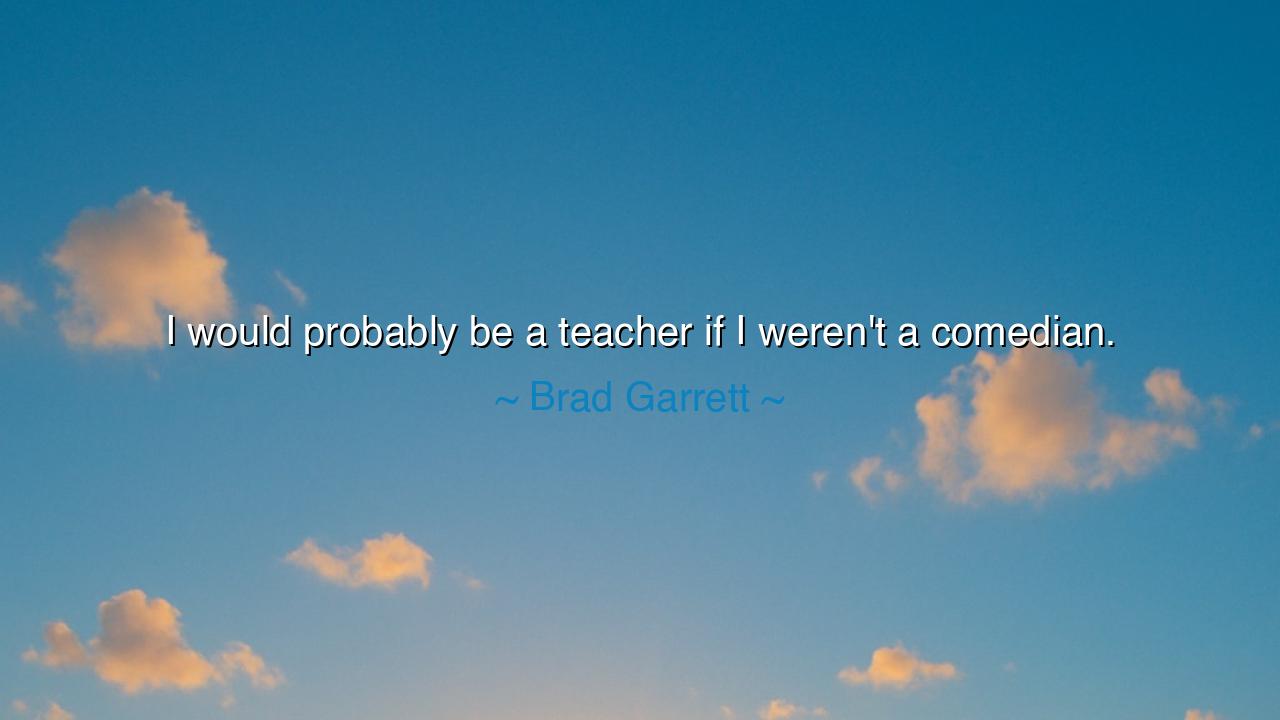
I would probably be a teacher if I weren't a comedian.






Brad Garrett, known to the world for his towering frame and booming voice, once said with disarming honesty: “I would probably be a teacher if I weren’t a comedian.” Though spoken casually, these words unveil a deep kinship between two vocations that, on the surface, appear far apart. For both the teacher and the comedian stand before others, seeking not merely to be heard, but to transform hearts — one with wisdom, the other with laughter.
The origin of such a thought lies in the very nature of performance and instruction. The comedian, in truth, is also a kind of teacher. He holds up a mirror to society, exposing its follies, its weaknesses, its secret truths. With humor he disarms, and through laughter he instructs. The teacher, in turn, must often be a comedian, using wit to hold attention, joy to make hard lessons palatable, and humanity to reach his pupils’ hearts. Garrett’s reflection suggests that he recognized this kinship: that whether through lessons or laughter, his calling was always to guide, to uplift, to connect.
History offers striking examples of this union. Socrates, the great philosopher of Athens, was said to employ irony and playful questioning that often made his listeners laugh before it made them think. Mark Twain, though remembered as a writer and humorist, taught his audiences as much as he entertained them, weaving deep critique of society into jokes and stories. Both show us the same truth Garrett intuited: that to teach and to entertain are not opposed paths, but branches of the same tree of influence.
The comparison also reveals a profound respect for the teacher. For Garrett did not say he would be a politician, a businessman, or an athlete if comedy had not claimed him. He said a teacher — a guide of minds, a shaper of futures. This is no light choice. It is as if, in his heart, he knew that comedy was not merely about laughter, but about helping people see the world differently, even if for a moment. In this sense, every good comedian carries the spirit of a teacher, just as every good teacher must possess the art of humor.
But the statement also speaks to the nobility of parallel callings. For not all are called to be comedians, and not all to be teachers. Yet both require courage: to stand before others, to risk failure, to be vulnerable. Both require empathy: to know what the audience or the classroom needs, and to meet them there. And both require dedication: the comedian refining timing, the teacher refining lessons — both laboring for the transformation of those before them.
The lesson for us, then, is to recognize the hidden kinships in our own callings. You may be an engineer but also an artist; a parent but also a philosopher; a worker but also a mentor. Do not imagine your gifts are limited to one domain. Garrett’s reflection reminds us that the skills of one calling often spill over into another, enriching life in unexpected ways. To laugh well is to teach joy; to teach well is to offer wisdom with a touch of delight.
What must you do? First, honor the teachers in your life, for their work is not so different from that of the comedian who lightens burdens. Second, embrace the power of humor, for it is a tool of connection, healing, and even instruction. Third, consider how your own talents may serve others in unexpected ways. Perhaps what you do today could have been another path altogether — but the heart of service, of uplifting others, remains the same.
Thus, let Brad Garrett’s words echo not as a throwaway thought, but as a truth of vocation: “I would probably be a teacher if I weren’t a comedian.” For in both roles lies the sacred task of shaping souls — one through wisdom, the other through laughter — yet both leading, in their own way, toward light.






AAdministratorAdministrator
Welcome, honored guests. Please leave a comment, we will respond soon